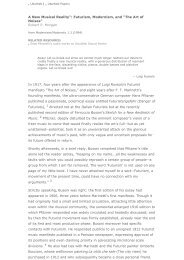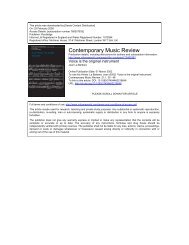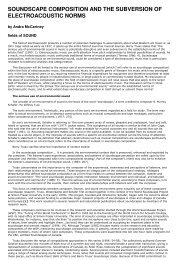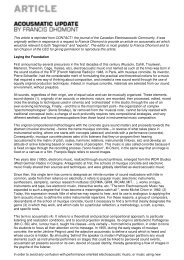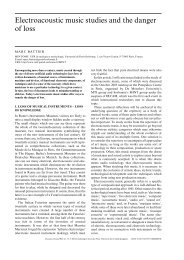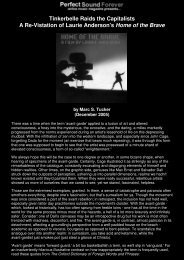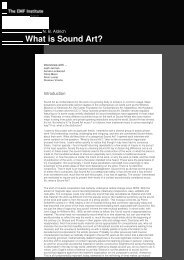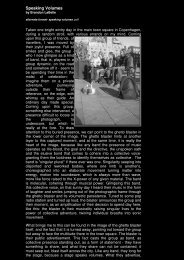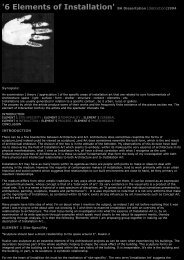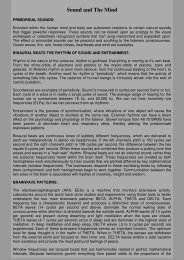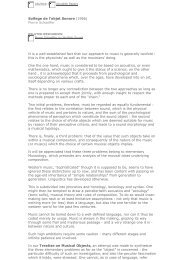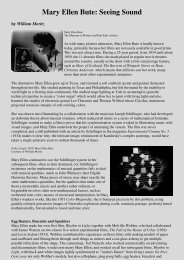Dunn-2008-Acoustic Ecology and the Experimental Music Tradition ...
Dunn-2008-Acoustic Ecology and the Experimental Music Tradition ...
Dunn-2008-Acoustic Ecology and the Experimental Music Tradition ...
- No tags were found...
Create successful ePaper yourself
Turn your PDF publications into a flip-book with our unique Google optimized e-Paper software.
data sonification, <strong>the</strong> aural equivalent to computer visualization techniques throughwhich streams of data are made more direct <strong>and</strong> experiential to researchers <strong>and</strong> <strong>the</strong>general public. The intervening years have also seen <strong>the</strong> emergence of a newresearch area known as bio-musicology as an attempt to formalize thinking about <strong>the</strong>biological origins of music.While all of <strong>the</strong>se events have to some extent more precisely advanced issuesoriginally put forth by <strong>Acoustic</strong> <strong>Ecology</strong>, fur<strong>the</strong>r blurring its original meaning <strong>and</strong>intellectual focus, <strong>Acoustic</strong> <strong>Ecology</strong> has itself influenced o<strong>the</strong>r disciplines beyond music<strong>and</strong> <strong>the</strong> arts. In several articles since his original fieldwork in Papua, New Guinea,anthropologist <strong>and</strong> ethnomusicologist Steven Feld has acknowledged Schafer'sinfluence upon his thinking about <strong>the</strong> role of sound perception as a unique organizingforce within culture. He has even gone on to fur<strong>the</strong>r innovate <strong>the</strong> methodologicalassumptions of his disciplines by pursuing a form of creative soundscape compositionthat is firmly grounded in <strong>the</strong> ideas of <strong>Acoustic</strong> <strong>Ecology</strong>.Taken toge<strong>the</strong>r, all of <strong>the</strong>se developments, whe<strong>the</strong>r originally based within <strong>the</strong> arts or<strong>the</strong> sciences, have blurred former distinctions while attempting to delineate new ones.While some of <strong>the</strong> emerging genre categories seem arbitrary—<strong>and</strong> in some cases asra<strong>the</strong>r transparent attempts by individuals to stake out turf boundaries—o<strong>the</strong>rs maystick for some time <strong>and</strong> even stabilize into fully-fledged research or aes<strong>the</strong>ticdomains. It is obvious that some commentators within <strong>the</strong> traditional music worldhave seen <strong>the</strong> development of <strong>the</strong>se new events <strong>and</strong> genres as directly hostile totraditional musical values. Meanwhile, many "sound artists" have seemed eager topart from <strong>the</strong> music world's aes<strong>the</strong>tic <strong>and</strong> educational expectations. They oftenreinvent concepts that <strong>the</strong> experimental music community has always embraced butcan now be retrofitted into <strong>the</strong> art market gallery system. My position is that many of<strong>the</strong>se new fields are a logical evolution in musical practice ra<strong>the</strong>r than a break with it.If music in any way reflects <strong>the</strong> evolving human condition, <strong>the</strong>n this is what weshould have expected music to become in <strong>the</strong> 21st century.As a parallel way of thinking to <strong>the</strong> visually dominant metaphors of human speech<strong>and</strong> written symbols, music is also a kind of conserving strategy for ways ofcommunicating that are closer to how o<strong>the</strong>r forms of life may communicate. Eventhough it has been a means to organize <strong>and</strong> perceive communicative sonic patterns,it is only remotely related to human linguistic structures. From an environmentalviewpoint, music may have been a means through which humans structurally coupledto <strong>the</strong> larger systems of mind that comprise our natural <strong>and</strong> social environments.Beyond <strong>the</strong> cultural richness <strong>and</strong> entertainment that recent uses for music afford us,assumptions about musical authorship, communicative intention, emotionalexpression, <strong>and</strong> musical genius may—in evolutionary terms—be short-termphenomena <strong>and</strong> even distractions from a more profound significance.Failed attempts to identify objective content of expression within <strong>the</strong> musical objectare as numerous as those that have tried to assign <strong>the</strong> phenomena of mind to aspecific locus. As a distributed network of signification, musical semantics emergefrom an infinite set of superabundant associations <strong>and</strong> uses that cannot be fixedexcept through somewhat arbitrary <strong>and</strong> geographically limited cultural agreements.The continued dominance of 19th-century assumptions about musical value beingdetermined by our belief in its capacity to convey self-expression <strong>and</strong> emotionalcontent arises from this condition. The cliché that music is a universal language is achimera.While <strong>the</strong>re may be certain physiological constants that contribute to stableperceptual factors that we associate with musical experiences—<strong>the</strong> fact that we haveyet to discover a human society without it seems particularly significant, as dodiscoveries about <strong>the</strong> ability of music-making to alter <strong>the</strong> hardwiring of braindevelopment—we are only beginning to scratch that particular research surface. Wecurrently know very little, <strong>and</strong> too much of <strong>the</strong> psychoacoustic research tends to grindan ideological axe from aes<strong>the</strong>tic biases or is fooled by simplistic semantics <strong>and</strong> falsedistinctions. For example, composer Kenneth Gaburo told me about a tellingconversation he once had with a prominent psychologist, who—in attempting todiscuss musical phenomena in <strong>the</strong> context of current <strong>the</strong>ories concerning hemisphericlateralization <strong>and</strong> localization of brain functions—had assigned melody to <strong>the</strong> lef<strong>the</strong>misphere of <strong>the</strong> brain (as a supposedly linear perceptual function) <strong>and</strong> chord to <strong>the</strong>right hemisphere (as a supposedly non-linear perceptual function). Kenneth pointedout how, in <strong>the</strong> process of composition, one often conceived of a chord as verticalizedmelody <strong>and</strong> a melody as a horizontalized chord. Therefore—given this potential for acreative shift in functional underst<strong>and</strong>ing—could such a simplistic hemisphericassignment be made? The psychologist responded by accusing Kenneth of being an



